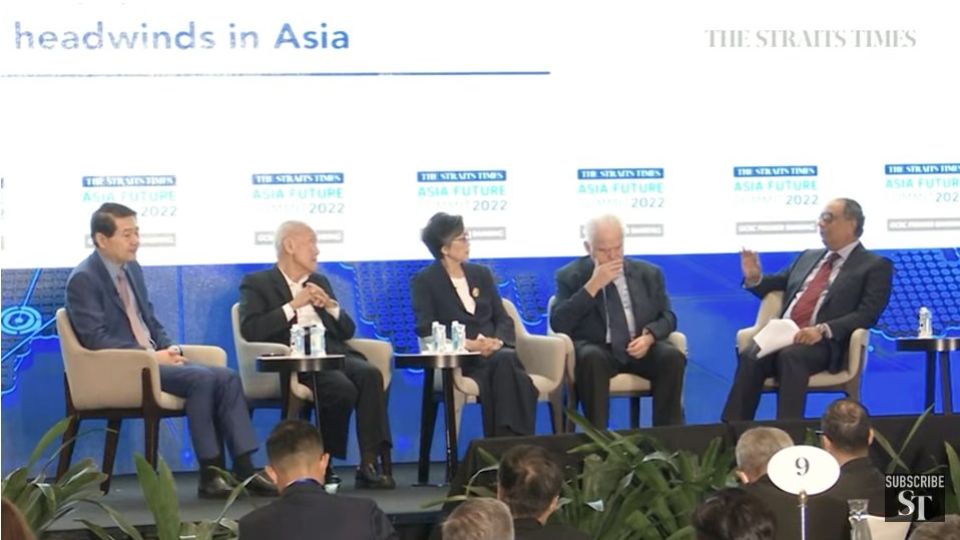November 2, 2022
SINGAPORE – The only reason for a potential war between China and the United States is over Taiwan – and much of it has to do with maintaining naval supremacy, according to eminent historian Wang Gungwu.
The US is a global superpower at sea, and would consider it “unacceptable” if China challenges it in that domain, Professor Wang said on Tuesday.
But, while the US would not normally consider China a maritime threat – which is also why Prof Wang believes the two sides would not go to war over the South China Sea or the East China Sea – Taiwan is in a unique spot.
“To the Americans, Taiwan is a crucial link in the maritime control over the whole of Asia, and for that reason they cannot let Taiwan go,” he said. “This is why… we have reason to fear that something could happen.”
Prof Wang added: “What the Americans could do is to continue to make Taiwan… more and more attached and dependent on the United States so that the Chinese can never take Taiwan. If that is the goal, then we are in for very tense years and decades ahead.”
He was speaking at the one-day Asia Future Summit at Raffles City Convention Centre, organised by The Straits Times.
Prof Wang was part of a four-person panel – moderated by ST associate editor Ravi Velloor – that discussed Asia’s geopolitical headwinds and whether the region could see war.
Beijing views Taiwan as a renegade province awaiting reunification with the mainland, and has repeatedly said that it does not rule out force to do so if necessary. Taiwan, however, rejects China’s sovereignty claims and has, under President Tsai Ing-wen, increasingly fostered closer relations with Washington, galling Beijing.
But the Taiwan issue is just one factor in the heightened tensions between China and the US, said former Singapore ambassador to the US Chan Heng Chee. Things between the two are in “such a bad place” that the strife seems unlikely to bottom out.
Professor Chan said this situation can be traced back to 2015, when the US first began to view China as a “peer rival”.
“The US came to the realisation that China had amassed critical power – in the economy, in the military, in technology and soft power, as well as diplomatic clout,” she said. The two powers have been locked in a fight for dominance since, added Prof Chan.
“The predominant power has the ability to define the rules of the road in the international system and set the example for other economies.”
Dr Henry Wang Huiyao, president of the Centre for China and Globalisation and a former Chinese government adviser, noted how China’s quick rise on the world stage had taken many by surprise.
“(China) has a different system of governance… and that takes time getting used to,” he said, adding: “I think Asia now can be a more prominent geopolitical force and balance in power.”
In a straw poll of the summit’s attendees, more than 85 per cent felt that there could be war in North-east Asia in the next five years. But 84 per cent also felt that South-east Asia would stay neutral if a war broke out between China and the US. All the panellists agreed that any war between the two super rivals should be avoided at all costs.
One critical solution is for the US and China to hold more dialogue, said Prof Chan, who spent 16 years in Washington as an ambassador.
“When I left the United States in 2012, there were some 300-plus dialogues between the US and China, at every level. Today, dialogues are not going on,” she said. “Once you restore dialogues, can you move to a path of avoiding war?”
If, indeed, war broke out, it would be disastrous for all, said American political scientist Graham Allison, in a pre-recorded interview that was screened earlier at the summit.
Professor Allison said that the two competitive powers must understand that they have to coexist – or the alternative would be to “co-destruct”.
This comes as China is expanding its nuclear arsenal as part of Beijing’s ambitious military build-up.
“If there was a war between the US and China – if something started in Taiwan or here or there – ultimately that war… could destroy both societies,” Prof Allison said. “A nuclear war cannot be won, so it must therefore never be fought.”
OCBC Bank is the premier sponsor of the ST Asia Future Summit.


